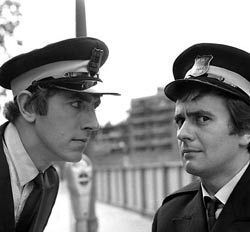
In Ghost Town, Bertram Pincus (Ricky Gervais) sees dead people thanks to a botched medical procedure. Manhattan has a lot of them. Dead people, that is, roaming around with unfinished business, looking very normal to each other, and now to Pincus, but invisible to everyone else. They look so normal that Pincus isn't even aware of his new ability until he joins a group of people crossing the street, steps in front of a moving cab, and startles at the screeching brakes and sudden horn. He didn't realize the other people are ghosts whom the cab driver can't see.
We behave differently in crowds. We're more likely to join a pack crossing the street than dart out alone during a yellow light, because we know the cars are already stopping for other people, because we know that any blame will be spread across all of us. We'll decide to stand or sit, head for the exit or wait in line, by weighing the actions of other people, and for a minute the film seems to have built this common social math into its story: What if one man sees a crowd that others don't?
However, screenwriters David Koepp and John Kamps have a different reason for including the cab scene: it tells the ghosts that Gervais is not one of them. "Hey, the cab stopped for you!" a dead person says. In that slight exchange, the film's trigonometry turns into simple addition, and it continues in that vein to the end. The acute social observation that I thought I saw never again rears its head.
But at least there's Ricky Gervais. He's a dentist, a Scrooge, a lonely curmudgeon. Greg Kinnear is a ghost with unfinished business, Téa Leoni is his widow, and the film's trick -- which practically performs itself -- is to make this triangle line up without using sines or cosines.

In more ways than one, Ghost Town reminds me of Bedazzled, the 1967 film by Stanley Donen that marked the big screen debuts of Dudley Moore and Peter Cook. Gervais has appeared in movies before, but never as the lead, just like Pete and Dud were known for being very funny on BBC television but hadn't tackled the silver screen. (Donen, of course, was known for directing Singin' in the Rain. And Royal Wedding. And Charade. And ...)
In Bedazzled, Cook plays the devil who takes Moore's soul in exchange for giving him what he asks for, which is somewhat different from what he actually wants. Therein lies the humor.
Even though both of these supernatural comedies are occasionally funny, they're an ill fit for their sharp stars. Bedazzled's gags are sometimes a hoot, but the medium seems to push against Pete and Dud, especially the post-synced sound which blunts the dialogue of two quick, verbal comedians. Cook wrote the screenplay, but he had to stretch his bits (and I think we all know how painful that can be) from their short form into a feature length film. Ghost Town does the opposite, compressing Gervais' character arc from thirteen episodes of The Office (the BBC original) into one movie, and the machinations required to do that only occasionally allow Gervais enough space to be witty. He seizes those opportunities and applies his masterful sense of the self-loathing asshole, which makes this film more enjoyable than its ghosty schematic might've been with other actors. And that may be why he -- like Moore and Cook -- emerges unscathed from a weak film.
What's most curious is that Ghost Town turns surprisingly touching by the end, even though it seems to build and then squander its momentum several times over. I may never understand how a clunky movie can make me misty, but it can happen, it does happen. Maybe it's Gervais' disarming likability, or the film's genuine but simple belief in good hearts, or its willingness to give Dr. Pincus a history that's quite mundane, thereby explaining his personality not with deep drama but ordinary pain. Or maybe it's the long gaps between the moments that connect, gaps long enough to make the appearance of each one a little surprise.



